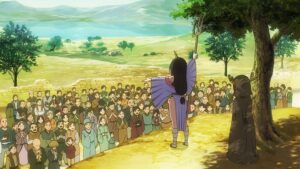It can be easy to forget just how big Dragon Maid’s cast is, since a lot of its supporting members are pretty one-note, but these two episodes did a great job of checking in with (nearly) all of them. Some of those check-ins were better than others, though, particularly the imaginative and revelatory trip down Tohru and Elma’s shared memory lane. I think I mentioned this earlier in my coverage of the series, but I’ve never paid much attention to its lore, so it’s possible that we already knew about this chapter of their lives and this episode merely gave us a longer look. Whether it was brand new or a simple expansion, the beautiful Middle Eastern setting gave the dragons’ first meeting a visual specificity that I loved. Tohru and Elma would have sought out the relative freedom of the human world millennia ago, given their loose alignment with their clans’ value systems, so the fact that they crossed paths in proximity to the fertile crescent made all the sense in the world.
Neither of them have entirely broken away from the lessons of their youth, however – their instant antagonism stemmed from the hatred that the Chaos and Harmony factions have for each other. As I watched, I thought it a little absurd that two travelers who had crossed dimensional boundaries would end up fighting over the beliefs of their families. Tohru and Elma’s battle scene, as cool as it looked, resulted from ideological differences that they could have set aside without much trouble. As a matter of fact, they did set them aside for several decades prior to their city-leveling conflict, as they traveled the earth in search of an answer to their debate about human potential. That’s how episode 5’s A-part ended – with a look at the quiet moment when Elma slipped away from the city that worshipped her and joined Tohru in her nomadic lifestyle. Circling back around to this scene was important, because it cemented their partnership as the ideal form of their relationship, rather than the destruction they wreaked at their height of their antagonism.
Everyone else’s stories ranged from good to trivial – the best of the leftovers was probably Ilulu’s job hunt (the other half of episode 5, making it the clear winner between the two weeks). The idea that she’s suspended in a childlike state is still integral to understanding her character, since the job she eventually takes (candy store cashier) is one where she can be around kids. Watching them play and helping them buy the things they want are her ways of indulging in the freedoms that she didn’t have. In a bizarre way, her ridiculous character design suits her emotional arc, since she has physical characteristics of both children and adults, just as she’s mentally caught between the two phases. In today’s episode, Fafnir told Takiya that dragons didn’t see a difference between the two, which goes a bit further in explaining how Ilulu might struggle to find a sense of self, now that she’s been thrust into a world with a clear dichotomy where stages of life are concerned. (That comment aside, Takiya’s attempts to get Fafnir out of the apartment were my least favorite story of the last two weeks – we didn’t even get to see his parents visit, which was the impetus for the whole plot!)
The Shouta/Lucoa and Kanna/Saikawa bits from episode 6 involved heavy doses of the age-related fetishes that power both relationships, which are things I just roll with whenever watching Dragon Maid. The girls’ excursion to the fork in the river was mostly an excuse for Saikawa to emit steam from her pores whenever Kanna did something cute, but it did use a lot of high and wide angles to give their trip a sense of grand adventure. How an anime series frames children’s play says a lot about its understanding of them as characters, and Dragon Maid scores pretty highly on that scale, even if it scores much lower on some others. Speaking of which, Shouta’s attempts to discover and exploit one of Lucoa’s weaknesses did absolutely nothing to convince me that their stories together are worthwhile. In constructing a story about leveling the power imbalance between the two of them, all the show did was make Lucoa an even more motherly figure to him (fitting, since that’s the Freudian explanation for shota fascination). This series doesn’t revolve around Shouta, so it’s tough to tell a worthwhile tale with him at the center. Despite my lack of interest in his character, though, I’m interested to see if KyoAni can manage that feat this season.








